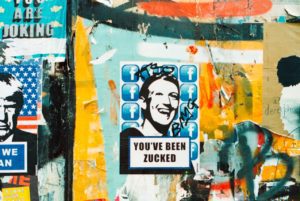Among the most pressing threats to democracy in the digital age is the spread of misinformation and the inability to apply rational thought and reason to what they see on the internet. From Covid-19 myths to cancel culture, society seems to be jumping to conclusions on topics they have little-to-no knowledge about without second thought – all because they read it online. Such an issue has recently infiltrated United States politics through an unprecedented course: the rise of a conspiracy theory naming the US leaders as cannibalistic pedophiles who run an international child-trafficking ring.
If you think that is strange, the group’s hero in this narrative is none other than former president Donald Trump, claiming that this “pedophiliac organization” was plotting against him during his time in office, and that, of course, Trump himself is the answer to ending such a regime. Even worse, this conspiracy is promoted, whether it be explicitly or implicitly, by major political figures in the US, such as Donald Trump and Georgia Republican Senator Marjorie Taylor Greene. The sphere of influence that the Q-anon conspiracy possesses over the American people, and now worldwide, is an evident threat to democracy, as the anonymous user “Q” holds the power to sway large groups of people to believe whatever (s)he says about the government without any evidence.
The Q-anon conspiracy was born in November 2017 on the anonymous messaging site “4Chan”, where a user began posting messages about the government claiming that he was a high-ranking military official in the United States government with Q-level security clearance. Such security clearance means that the individual has access to classified information regarding nuclear weapons and their manufacturing – data extremely sensitive to the security of the nation.
Over the years, upwards of 5,000 posts, or “Q drops”, have been made by “Q”, who is speculated to be a group rather than an individual, promoting extreme-right views on the government and “exposing” secrets about government officials. At the root of the conspiracy is the belief that there will one day come the reckoning, or the arrest and execution of corrupt government officials, where the fight against the evils of global powers will come to an end.
While this conspiracy is based on close to zero concrete evidence, approximately 15% of Americans believe that “the government, media, and financial worlds in the U.S. are controlled by a group of Satan-worshipping pedophiles who run a global child sex trafficking operation” according to a recent poll. The willingness to believe baseless conspiracies to such an extreme extent demonstrates the critical state of the United State’s democracy as the country exits the Trump era. Even more frightening is the ability of “Q” to draw people to real-life action – and violence.
Q-anon support was largely present during the extreme violence and anarchy displayed at the January 6 riot at the US Capitol, making up 8% of the crowd. Here, members of the movement displayed their support in real-life action rather than from behind screens for the first time as a coherent entity. The event turned out to be deemed an act of domestic terrorism that yielded the largest criminal investigation in the country’s history.
At least 34 known followers were present at the riot where 5 casualties occurred as a result of forceful entry, vandalism, and assault towards the Capitol building and employees, police officers, and governmental figures alike. In the end, 140 police officers were seriously injured, a multitude of artifacts were stolen, including Speaker of the House Nancy Pelosi’s podium and laptop, and serious vandalism, such as broken windows and doors, resulted in more than 675 criminal charges.
While 34 people seem like an insignificant statistic, Q-anon adherents making up such a portion of the capital rioters signifies a much larger pool of supporters than previously thought. At the same time, this reveals a growing percentage of the population willing to believe baseless conspiracies, providing the foundation for the argument that the United States’ democracy is in jeopardy at the hands of misinformation and the willingness of the common American to believe such baseless things.
Much to blame is the spread of such misinformation by high-ranking politicians. Senator Majorie Taylor Greene, as well as at least a dozen more Republican candidates, have expressed their strong support for the Q-anon phenomenon, with several remaining as current members of Congress. Amazon has also played a part in the spread of the conspiracy, continuing to sell Q-anon merchandise on the website up until seeing the aftermath of the Capitol Riot.
The implications of a population so easily swayed by baseless theories spread via the internet is among the greatest threats to democracy in the digital age – and not just for the United States. Since Q-anon has taken hold, supporters have begun taking anarchical action towards the government that would never have occurred without the ideas of Q, whose identity remains anonymous, fueling their fire.
For many, this movement is just a way to justify their means of violently and unconstitutionally protesting against a political party they reject, and the actual content is irrelevant as long as they can utilize the message as they wish. On a larger and more global scale, such conspiracies spread through the internet have the potential to cause similar or more serious harm to any democracy, as people are unbelievably susceptible to what they read online. The overarching threat here is the ability for a baseless theory to influence the way people vote, act, and feel towards a certain government, and the tyrannical events that follow. Democratic values prioritize the freedoms of the press and of speech, however, the abuse of such liberties by those whose intentions are to promote pro-Trump propaganda jeopardizes the original objectives of US democracy.
Moving forward, such a scenario happening in the United States implies the vitality of the common person to be meticulous in what they believe from any source and denotes the essentiality of trustworthy sources and data before believing a theory as such. In the age of technology where misinformation is more prevalent by the day, the future of democracy depends on the rationale of the reader.






